Security Engineer Resume Examples

Jul 18, 2024
|
12 min read
Protect and serve: Tips on how to write a security engineer resume that gets you noticed and lands you the job.
Rated by 348 people
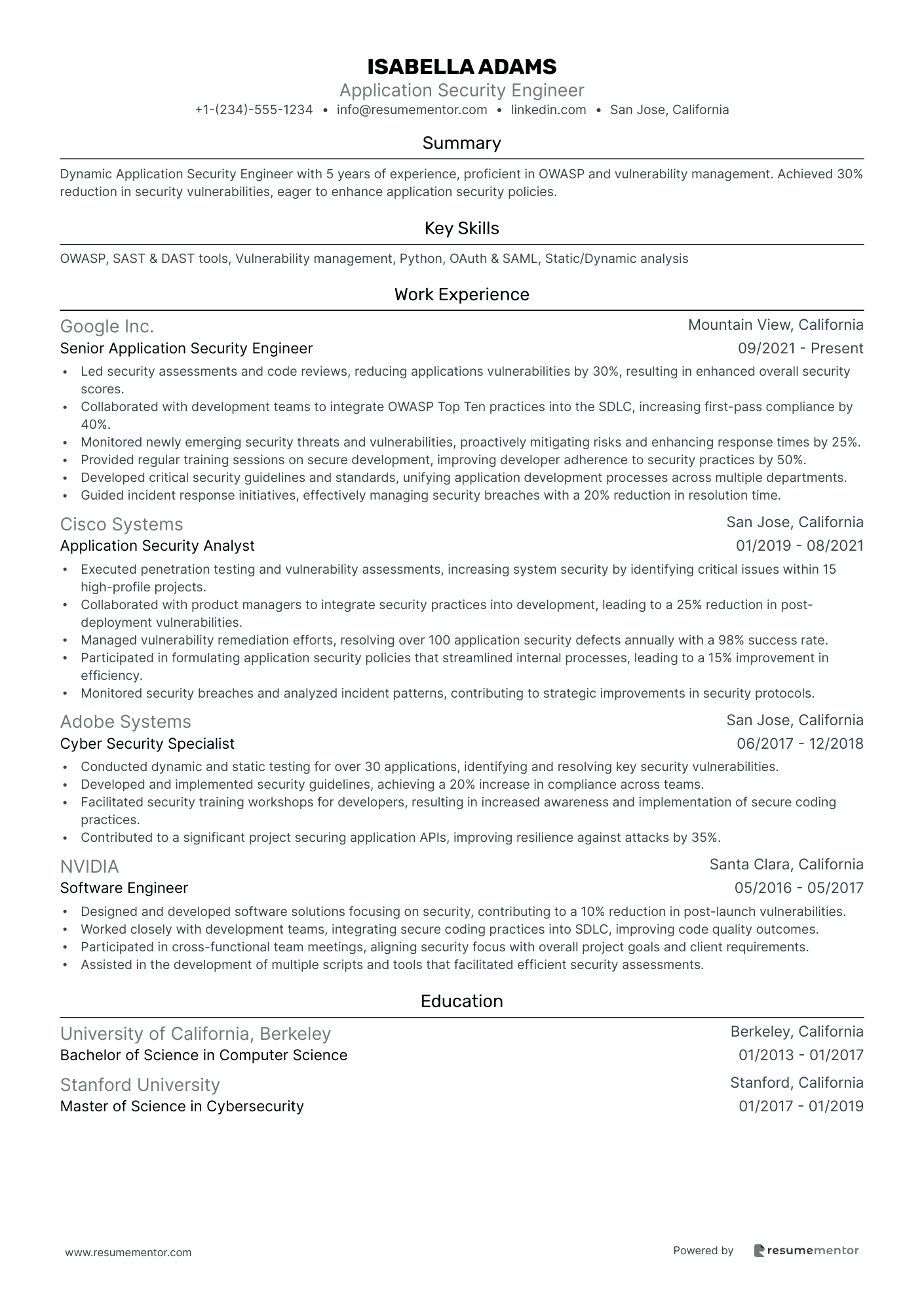
Application Security Engineer
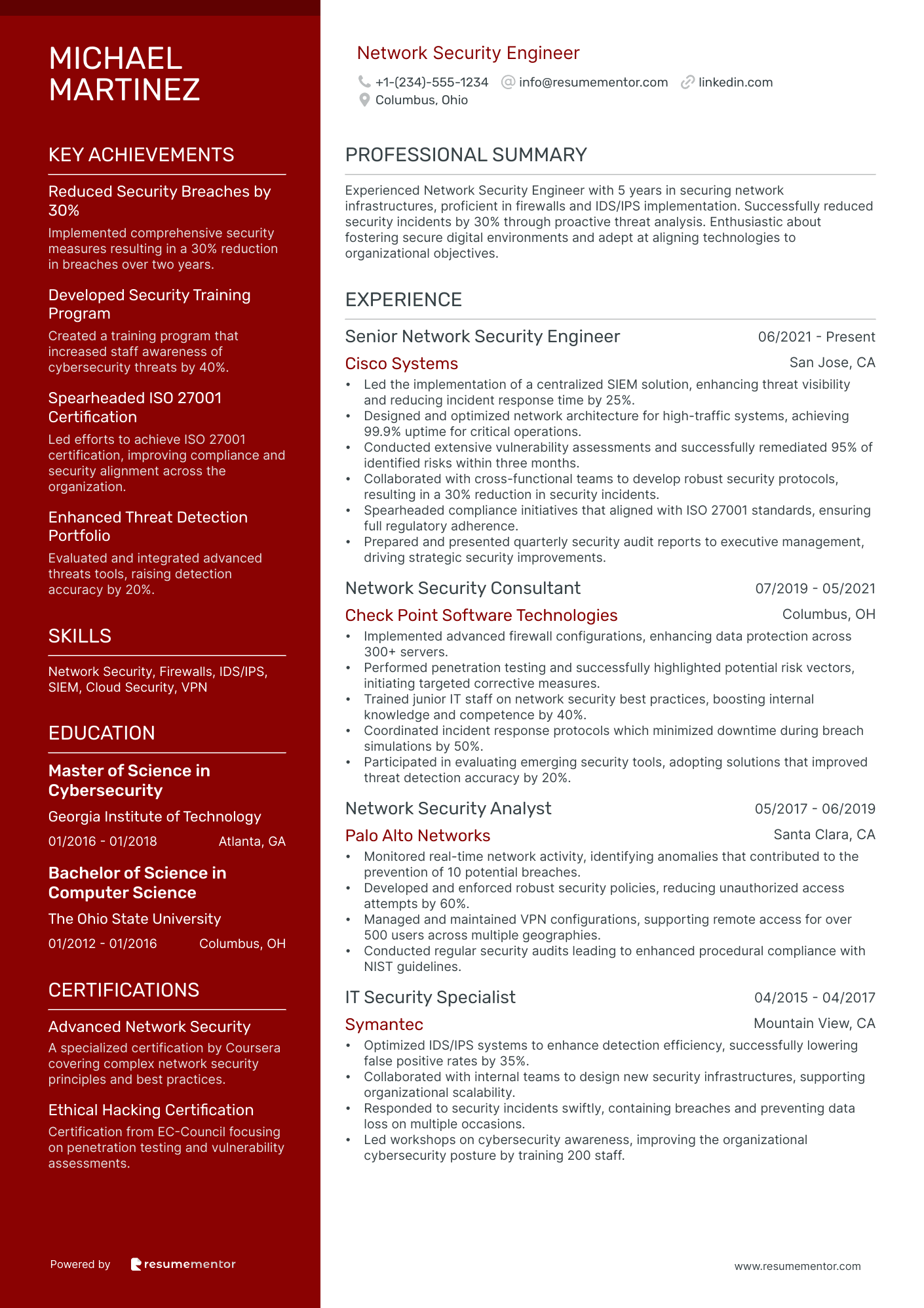
Network Security Engineer
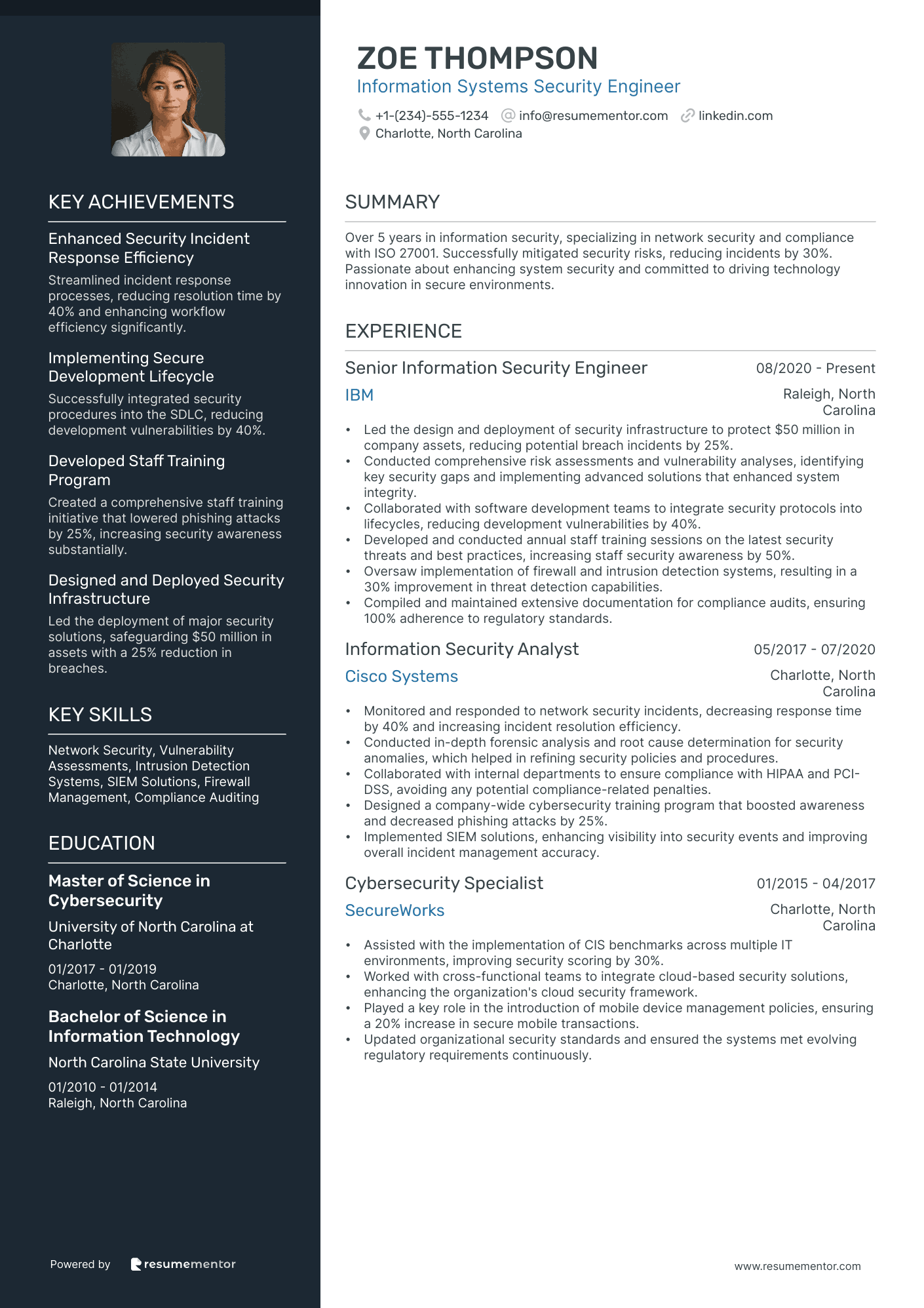
Information Systems Security Engineer
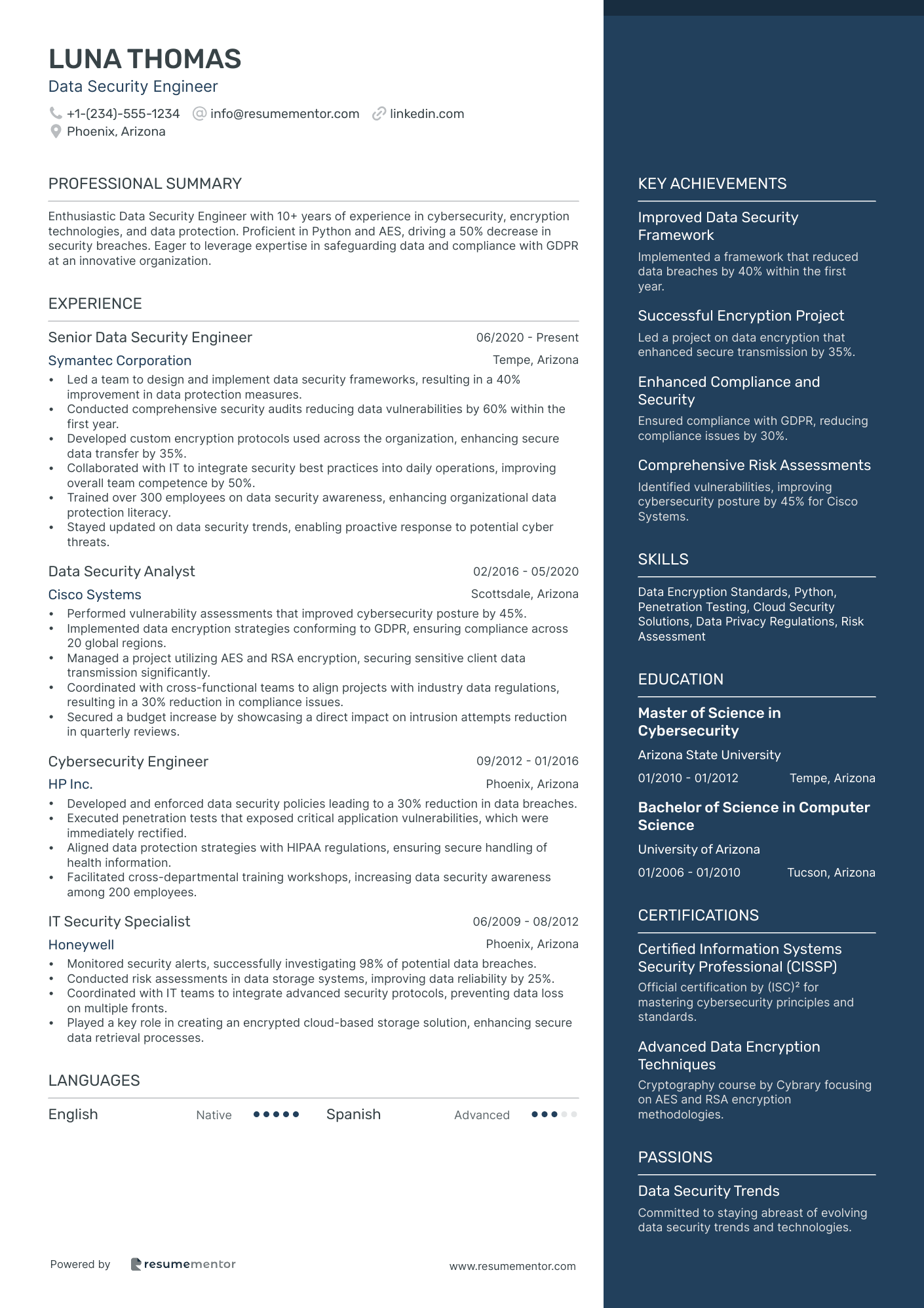
Data Security Engineer
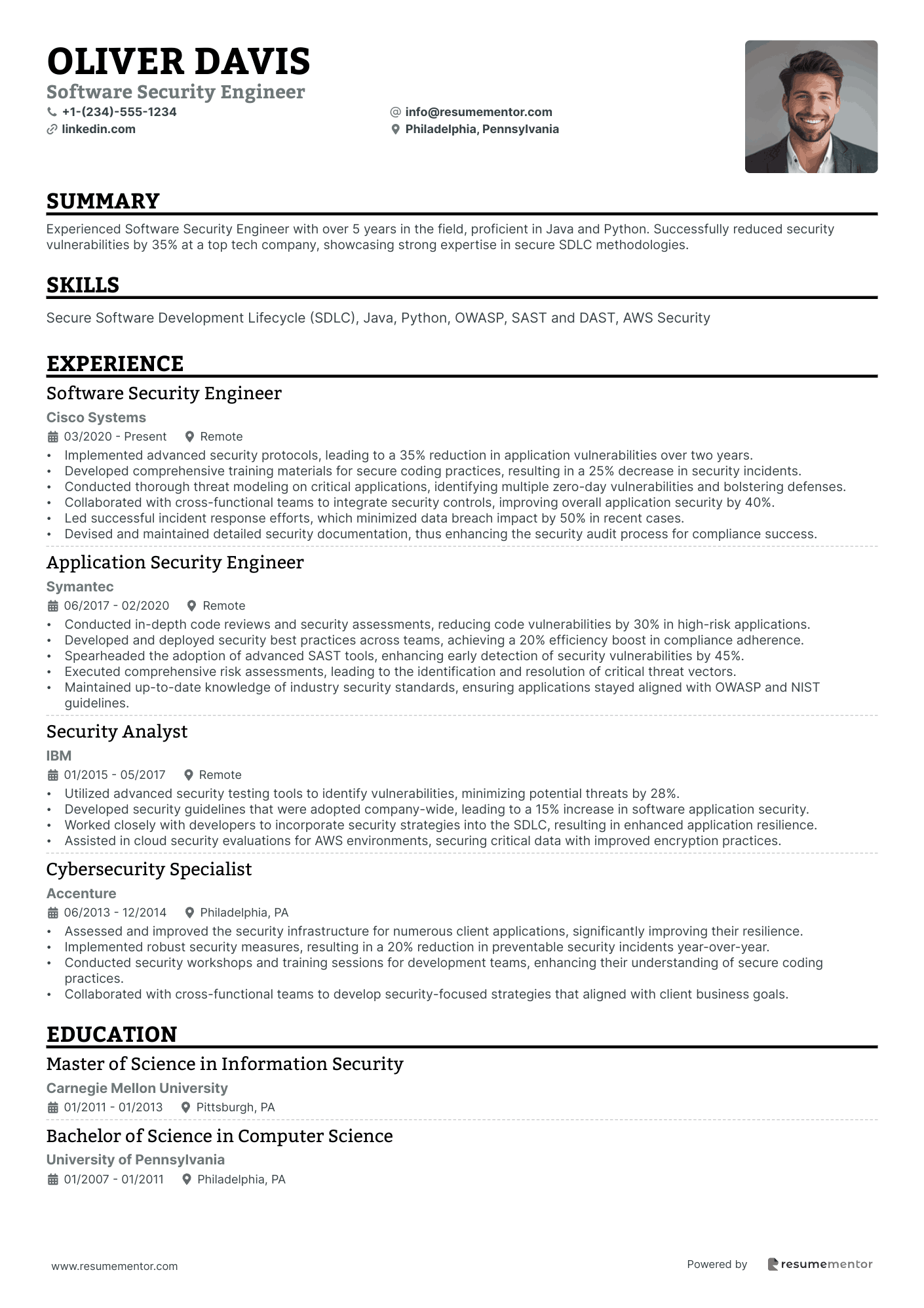
Software Security Engineer
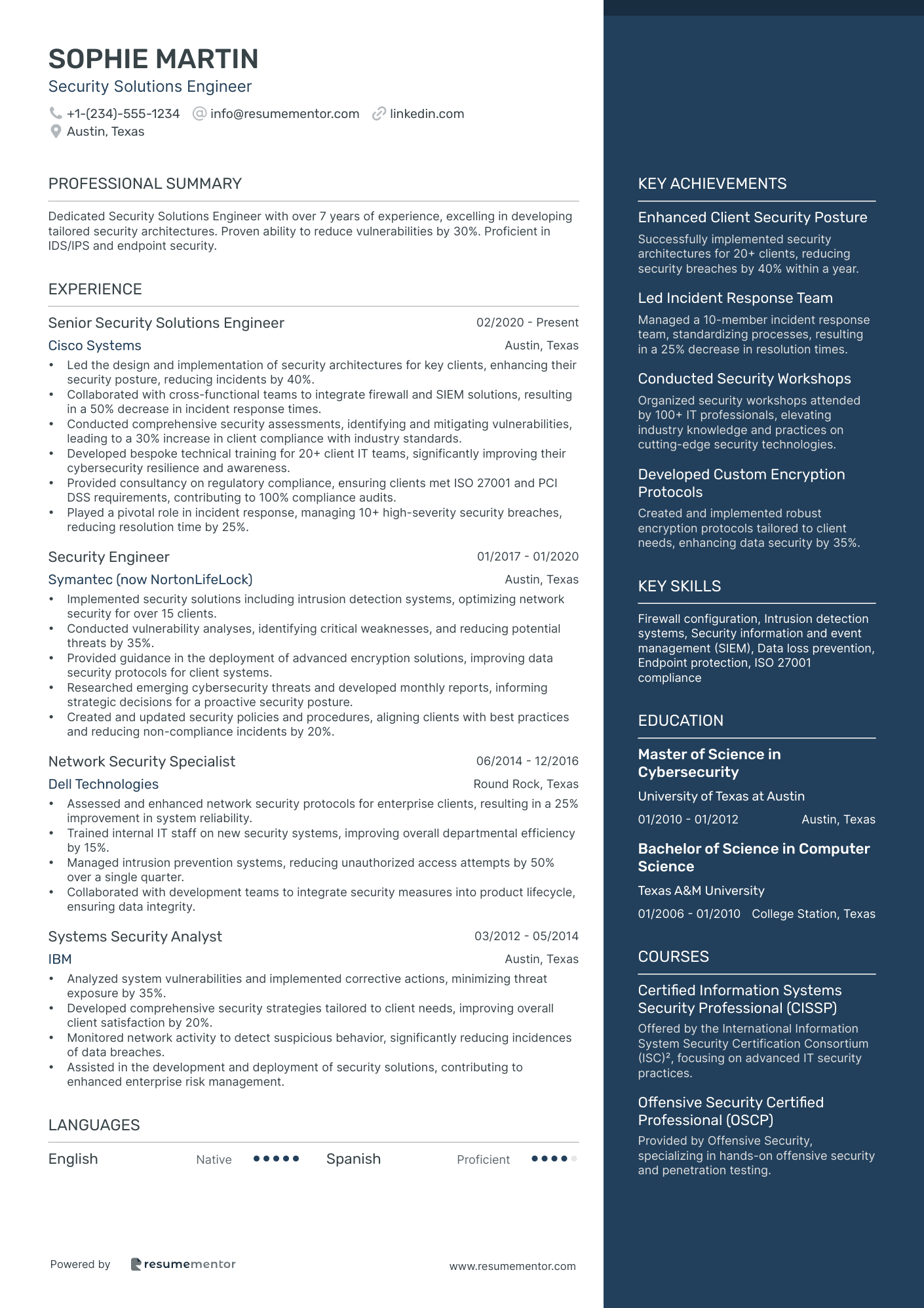
Security Solutions Engineer
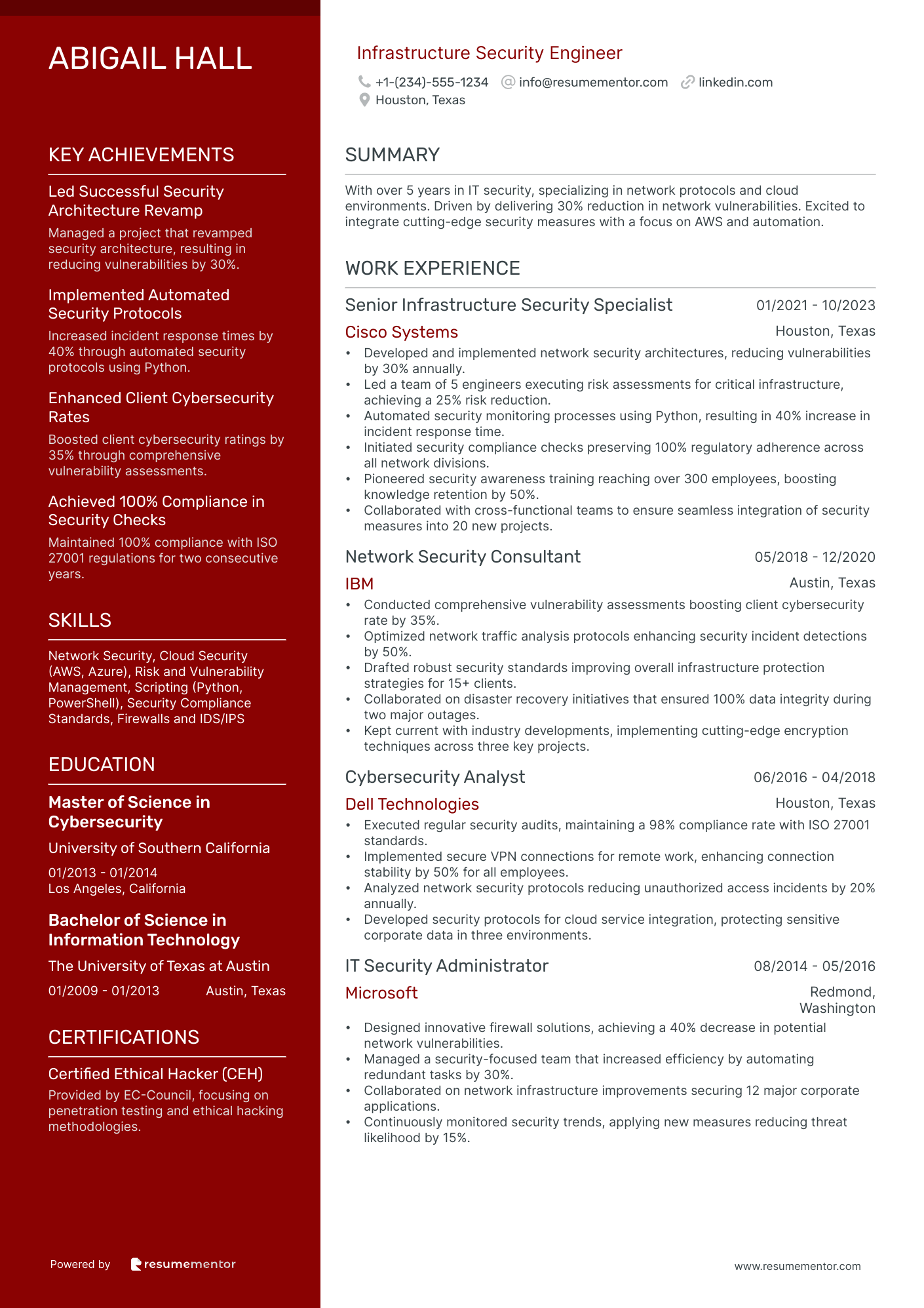
Infrastructure Security Engineer
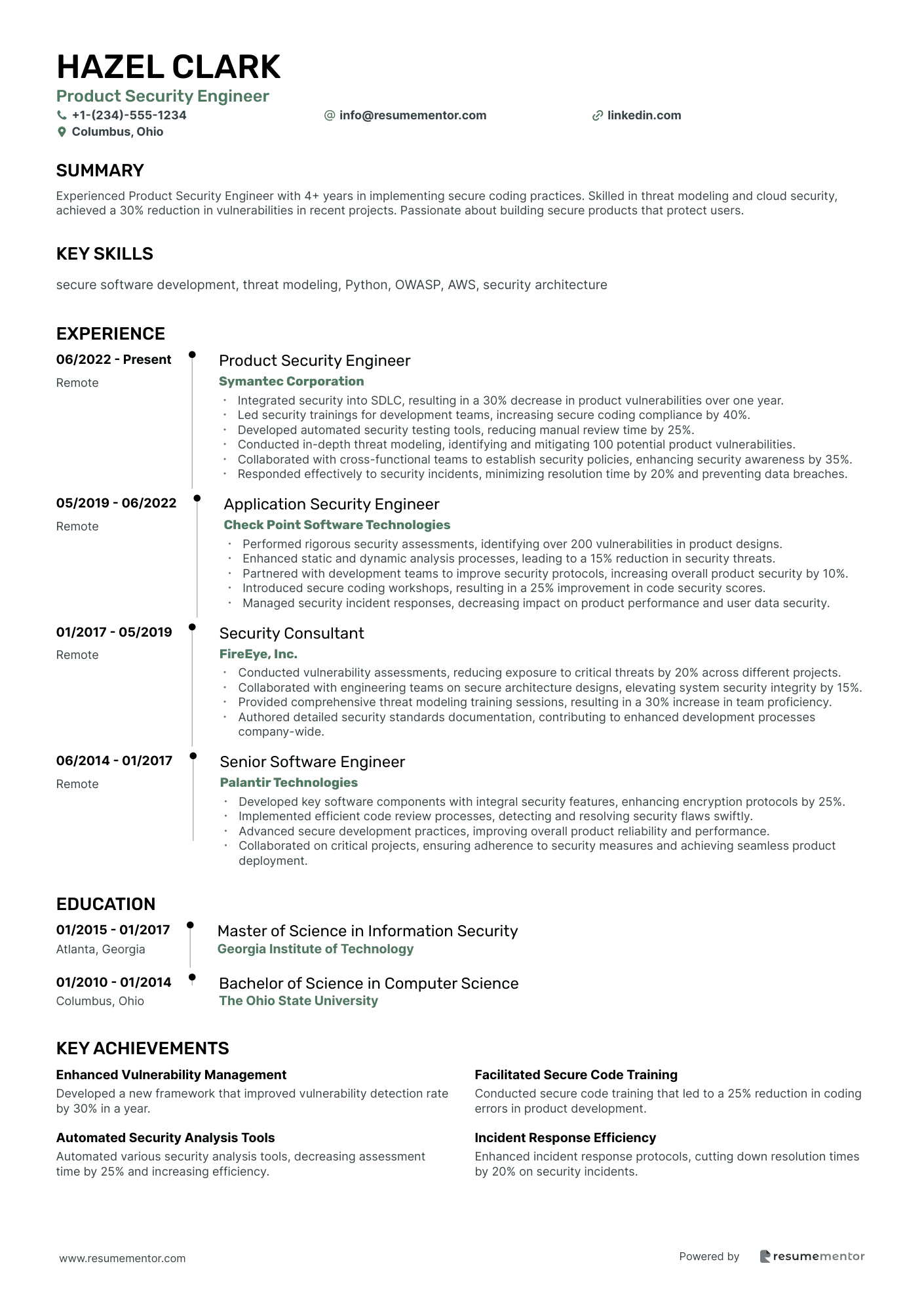
Product Security Engineer

Application Security Engineer resume sample
- •Led security assessments and code reviews, reducing applications vulnerabilities by 30%, resulting in enhanced overall security scores.
- •Collaborated with development teams to integrate OWASP Top Ten practices into the SDLC, increasing first-pass compliance by 40%.
- •Monitored newly emerging security threats and vulnerabilities, proactively mitigating risks and enhancing response times by 25%.
- •Provided regular training sessions on secure development, improving developer adherence to security practices by 50%.
- •Developed critical security guidelines and standards, unifying application development processes across multiple departments.
- •Guided incident response initiatives, effectively managing security breaches with a 20% reduction in resolution time.
- •Executed penetration testing and vulnerability assessments, increasing system security by identifying critical issues within 15 high-profile projects.
- •Collaborated with product managers to integrate security practices into development, leading to a 25% reduction in post-deployment vulnerabilities.
- •Managed vulnerability remediation efforts, resolving over 100 application security defects annually with a 98% success rate.
- •Participated in formulating application security policies that streamlined internal processes, leading to a 15% improvement in efficiency.
- •Monitored security breaches and analyzed incident patterns, contributing to strategic improvements in security protocols.
- •Conducted dynamic and static testing for over 30 applications, identifying and resolving key security vulnerabilities.
- •Developed and implemented security guidelines, achieving a 20% increase in compliance across teams.
- •Facilitated security training workshops for developers, resulting in increased awareness and implementation of secure coding practices.
- •Contributed to a significant project securing application APIs, improving resilience against attacks by 35%.
- •Designed and developed software solutions focusing on security, contributing to a 10% reduction in post-launch vulnerabilities.
- •Worked closely with development teams, integrating secure coding practices into SDLC, improving code quality outcomes.
- •Participated in cross-functional team meetings, aligning security focus with overall project goals and client requirements.
- •Assisted in the development of multiple scripts and tools that facilitated efficient security assessments.
Network Security Engineer resume sample
- •Led the implementation of a centralized SIEM solution, enhancing threat visibility and reducing incident response time by 25%.
- •Designed and optimized network architecture for high-traffic systems, achieving 99.9% uptime for critical operations.
- •Conducted extensive vulnerability assessments and successfully remediated 95% of identified risks within three months.
- •Collaborated with cross-functional teams to develop robust security protocols, resulting in a 30% reduction in security incidents.
- •Spearheaded compliance initiatives that aligned with ISO 27001 standards, ensuring full regulatory adherence.
- •Prepared and presented quarterly security audit reports to executive management, driving strategic security improvements.
- •Implemented advanced firewall configurations, enhancing data protection across 300+ servers.
- •Performed penetration testing and successfully highlighted potential risk vectors, initiating targeted corrective measures.
- •Trained junior IT staff on network security best practices, boosting internal knowledge and competence by 40%.
- •Coordinated incident response protocols which minimized downtime during breach simulations by 50%.
- •Participated in evaluating emerging security tools, adopting solutions that improved threat detection accuracy by 20%.
- •Monitored real-time network activity, identifying anomalies that contributed to the prevention of 10 potential breaches.
- •Developed and enforced robust security policies, reducing unauthorized access attempts by 60%.
- •Managed and maintained VPN configurations, supporting remote access for over 500 users across multiple geographies.
- •Conducted regular security audits leading to enhanced procedural compliance with NIST guidelines.
- •Optimized IDS/IPS systems to enhance detection efficiency, successfully lowering false positive rates by 35%.
- •Collaborated with internal teams to design new security infrastructures, supporting organizational scalability.
- •Responded to security incidents swiftly, containing breaches and preventing data loss on multiple occasions.
- •Led workshops on cybersecurity awareness, improving the organizational cybersecurity posture by training 200 staff.
Information Systems Security Engineer resume sample
- •Led the design and deployment of security infrastructure to protect $50 million in company assets, reducing potential breach incidents by 25%.
- •Conducted comprehensive risk assessments and vulnerability analyses, identifying key security gaps and implementing advanced solutions that enhanced system integrity.
- •Collaborated with software development teams to integrate security protocols into lifecycles, reducing development vulnerabilities by 40%.
- •Developed and conducted annual staff training sessions on the latest security threats and best practices, increasing staff security awareness by 50%.
- •Oversaw implementation of firewall and intrusion detection systems, resulting in a 30% improvement in threat detection capabilities.
- •Compiled and maintained extensive documentation for compliance audits, ensuring 100% adherence to regulatory standards.
- •Monitored and responded to network security incidents, decreasing response time by 40% and increasing incident resolution efficiency.
- •Conducted in-depth forensic analysis and root cause determination for security anomalies, which helped in refining security policies and procedures.
- •Collaborated with internal departments to ensure compliance with HIPAA and PCI-DSS, avoiding any potential compliance-related penalties.
- •Designed a company-wide cybersecurity training program that boosted awareness and decreased phishing attacks by 25%.
- •Implemented SIEM solutions, enhancing visibility into security events and improving overall incident management accuracy.
- •Assisted with the implementation of CIS benchmarks across multiple IT environments, improving security scoring by 30%.
- •Worked with cross-functional teams to integrate cloud-based security solutions, enhancing the organization's cloud security framework.
- •Played a key role in the introduction of mobile device management policies, ensuring a 20% increase in secure mobile transactions.
- •Updated organizational security standards and ensured the systems met evolving regulatory requirements continuously.
- •Administered and maintained firewalls, leading to a reduction in unauthorized network access by 35%.
- •Regularly performed security audits and vulnerability scans to identify weaknesses, resulting in enhanced security measures.
- •Created security policies for data protection and privacy adherence, achieving 100% compliance with corporate standards.
- •Managed endpoint protection technologies, significantly minimizing the threat surface of organizational devices.
Data Security Engineer resume sample
- •Led a team to design and implement data security frameworks, resulting in a 40% improvement in data protection measures.
- •Conducted comprehensive security audits reducing data vulnerabilities by 60% within the first year.
- •Developed custom encryption protocols used across the organization, enhancing secure data transfer by 35%.
- •Collaborated with IT to integrate security best practices into daily operations, improving overall team competence by 50%.
- •Trained over 300 employees on data security awareness, enhancing organizational data protection literacy.
- •Stayed updated on data security trends, enabling proactive response to potential cyber threats.
- •Performed vulnerability assessments that improved cybersecurity posture by 45%.
- •Implemented data encryption strategies conforming to GDPR, ensuring compliance across 20 global regions.
- •Managed a project utilizing AES and RSA encryption, securing sensitive client data transmission significantly.
- •Coordinated with cross-functional teams to align projects with industry data regulations, resulting in a 30% reduction in compliance issues.
- •Secured a budget increase by showcasing a direct impact on intrusion attempts reduction in quarterly reviews.
- •Developed and enforced data security policies leading to a 30% reduction in data breaches.
- •Executed penetration tests that exposed critical application vulnerabilities, which were immediately rectified.
- •Aligned data protection strategies with HIPAA regulations, ensuring secure handling of health information.
- •Facilitated cross-departmental training workshops, increasing data security awareness among 200 employees.
- •Monitored security alerts, successfully investigating 98% of potential data breaches.
- •Conducted risk assessments in data storage systems, improving data reliability by 25%.
- •Coordinated with IT teams to integrate advanced security protocols, preventing data loss on multiple fronts.
- •Played a key role in creating an encrypted cloud-based storage solution, enhancing secure data retrieval processes.
Software Security Engineer resume sample
- •Implemented advanced security protocols, leading to a 35% reduction in application vulnerabilities over two years.
- •Developed comprehensive training materials for secure coding practices, resulting in a 25% decrease in security incidents.
- •Conducted thorough threat modeling on critical applications, identifying multiple zero-day vulnerabilities and bolstering defenses.
- •Collaborated with cross-functional teams to integrate security controls, improving overall application security by 40%.
- •Led successful incident response efforts, which minimized data breach impact by 50% in recent cases.
- •Devised and maintained detailed security documentation, thus enhancing the security audit process for compliance success.
- •Conducted in-depth code reviews and security assessments, reducing code vulnerabilities by 30% in high-risk applications.
- •Developed and deployed security best practices across teams, achieving a 20% efficiency boost in compliance adherence.
- •Spearheaded the adoption of advanced SAST tools, enhancing early detection of security vulnerabilities by 45%.
- •Executed comprehensive risk assessments, leading to the identification and resolution of critical threat vectors.
- •Maintained up-to-date knowledge of industry security standards, ensuring applications stayed aligned with OWASP and NIST guidelines.
- •Utilized advanced security testing tools to identify vulnerabilities, minimizing potential threats by 28%.
- •Developed security guidelines that were adopted company-wide, leading to a 15% increase in software application security.
- •Worked closely with developers to incorporate security strategies into the SDLC, resulting in enhanced application resilience.
- •Assisted in cloud security evaluations for AWS environments, securing critical data with improved encryption practices.
- •Assessed and improved the security infrastructure for numerous client applications, significantly improving their resilience.
- •Implemented robust security measures, resulting in a 20% reduction in preventable security incidents year-over-year.
- •Conducted security workshops and training sessions for development teams, enhancing their understanding of secure coding practices.
- •Collaborated with cross-functional teams to develop security-focused strategies that aligned with client business goals.
Security Solutions Engineer resume sample
- •Led the design and implementation of security architectures for key clients, enhancing their security posture, reducing incidents by 40%.
- •Collaborated with cross-functional teams to integrate firewall and SIEM solutions, resulting in a 50% decrease in incident response times.
- •Conducted comprehensive security assessments, identifying and mitigating vulnerabilities, leading to a 30% increase in client compliance with industry standards.
- •Developed bespoke technical training for 20+ client IT teams, significantly improving their cybersecurity resilience and awareness.
- •Provided consultancy on regulatory compliance, ensuring clients met ISO 27001 and PCI DSS requirements, contributing to 100% compliance audits.
- •Played a pivotal role in incident response, managing 10+ high-severity security breaches, reducing resolution time by 25%.
- •Implemented security solutions including intrusion detection systems, optimizing network security for over 15 clients.
- •Conducted vulnerability analyses, identifying critical weaknesses, and reducing potential threats by 35%.
- •Provided guidance in the deployment of advanced encryption solutions, improving data security protocols for client systems.
- •Researched emerging cybersecurity threats and developed monthly reports, informing strategic decisions for a proactive security posture.
- •Created and updated security policies and procedures, aligning clients with best practices and reducing non-compliance incidents by 20%.
- •Assessed and enhanced network security protocols for enterprise clients, resulting in a 25% improvement in system reliability.
- •Trained internal IT staff on new security systems, improving overall departmental efficiency by 15%.
- •Managed intrusion prevention systems, reducing unauthorized access attempts by 50% over a single quarter.
- •Collaborated with development teams to integrate security measures into product lifecycle, ensuring data integrity.
- •Analyzed system vulnerabilities and implemented corrective actions, minimizing threat exposure by 35%.
- •Developed comprehensive security strategies tailored to client needs, improving overall client satisfaction by 20%.
- •Monitored network activity to detect suspicious behavior, significantly reducing incidences of data breaches.
- •Assisted in the development and deployment of security solutions, contributing to enhanced enterprise risk management.
Infrastructure Security Engineer resume sample
- •Developed and implemented network security architectures, reducing vulnerabilities by 30% annually.
- •Led a team of 5 engineers executing risk assessments for critical infrastructure, achieving a 25% risk reduction.
- •Automated security monitoring processes using Python, resulting in 40% increase in incident response time.
- •Initiated security compliance checks preserving 100% regulatory adherence across all network divisions.
- •Pioneered security awareness training reaching over 300 employees, boosting knowledge retention by 50%.
- •Collaborated with cross-functional teams to ensure seamless integration of security measures into 20 new projects.
- •Conducted comprehensive vulnerability assessments boosting client cybersecurity rate by 35%.
- •Optimized network traffic analysis protocols enhancing security incident detections by 50%.
- •Drafted robust security standards improving overall infrastructure protection strategies for 15+ clients.
- •Collaborated on disaster recovery initiatives that ensured 100% data integrity during two major outages.
- •Kept current with industry developments, implementing cutting-edge encryption techniques across three key projects.
- •Executed regular security audits, maintaining a 98% compliance rate with ISO 27001 standards.
- •Implemented secure VPN connections for remote work, enhancing connection stability by 50% for all employees.
- •Analyzed network security protocols reducing unauthorized access incidents by 20% annually.
- •Developed security protocols for cloud service integration, protecting sensitive corporate data in three environments.
- •Designed innovative firewall solutions, achieving a 40% decrease in potential network vulnerabilities.
- •Managed a security-focused team that increased efficiency by automating redundant tasks by 30%.
- •Collaborated on network infrastructure improvements securing 12 major corporate applications.
- •Continuously monitored security trends, applying new measures reducing threat likelihood by 15%.
Product Security Engineer resume sample
- •Integrated security into SDLC, resulting in a 30% decrease in product vulnerabilities over one year.
- •Led security trainings for development teams, increasing secure coding compliance by 40%.
- •Developed automated security testing tools, reducing manual review time by 25%.
- •Conducted in-depth threat modeling, identifying and mitigating 100 potential product vulnerabilities.
- •Collaborated with cross-functional teams to establish security policies, enhancing security awareness by 35%.
- •Responded effectively to security incidents, minimizing resolution time by 20% and preventing data breaches.
- •Performed rigorous security assessments, identifying over 200 vulnerabilities in product designs.
- •Enhanced static and dynamic analysis processes, leading to a 15% reduction in security threats.
- •Partnered with development teams to improve security protocols, increasing overall product security by 10%.
- •Introduced secure coding workshops, resulting in a 25% improvement in code security scores.
- •Managed security incident responses, decreasing impact on product performance and user data security.
- •Conducted vulnerability assessments, reducing exposure to critical threats by 20% across different projects.
- •Collaborated with engineering teams on secure architecture designs, elevating system security integrity by 15%.
- •Provided comprehensive threat modeling training sessions, resulting in a 30% increase in team proficiency.
- •Authored detailed security standards documentation, contributing to enhanced development processes company-wide.
- •Developed key software components with integral security features, enhancing encryption protocols by 25%.
- •Implemented efficient code review processes, detecting and resolving security flaws swiftly.
- •Advanced secure development practices, improving overall product reliability and performance.
- •Collaborated on critical projects, ensuring adherence to security measures and achieving seamless product deployment.
Crafting a security engineer resume is a vital step toward unlocking new career opportunities in the world of cybersecurity. As a security engineer, you're the guardian of digital systems, ensuring everything runs smoothly. This can make writing a resume feel as challenging as protecting a network from threats.
When tackling your resume, balancing technical details with job relevance is crucial. You need to highlight your tech expertise while ensuring the recruiter isn't overwhelmed, seamlessly conveying your problem-solving skills in an understandable way.
Using a professional format can organize your accomplishments and skills effectively. A well-structured resume template can help present your information with clarity and impact, which is essential in a field like cybersecurity where precision matters.
Reflecting a proactive attitude toward learning and adapting is equally important. Clearly mention certifications or training that keep you current in cybersecurity. This approach transforms your resume into more than a list of past duties—it becomes a comprehensive map of your career path.
Finally, by emphasizing your strengths and achievements, your resume can act as a beacon in a competitive job market. By investing time in perfecting your resume, you unlock doors to the next step in your career journey.
Key Takeaways
- Highlight your technical expertise and problem-solving skills, ensuring your resume balances detail with relevance.
- Use a professional format and template to present your accomplishments and skills clearly and effectively.
- Emphasize your proactive attitude toward learning, showcasing certifications and ongoing training in cybersecurity.
- Organize your content to present a clear career trajectory, using quantifiable achievements to demonstrate impact.
- Choose a resume format, font, and file type that enhance readability and maintain visual integrity across devices.
What to focus on when writing your security engineer resume
Your security engineer resume should clearly convey your cybersecurity skills and expertise, making it easy for the recruiter to see your capability in protecting digital assets and managing security protocols. This demonstrates your potential to contribute significantly to a safe and secure network environment.
How to structure your security engineer resume
- Contact Information — This section is crucial at the top of your resume, providing your full name, phone number, and email address, along with your city and state, which ensures that recruiters can easily reach you. Including a LinkedIn profile or personal portfolio URL not only enhances your credibility but also gives recruiters additional insight into your professional presence and projects.
- Professional Summary — This is where you give a concise overview of your background and what you bring to the table. Highlight significant security certifications and your dedication to cybersecurity. Emphasize your years of experience and notable achievements in safeguarding data, crafting a clear snapshot of your career that draws the recruiter’s attention.
- Technical Skills — Detail your proficiency with relevant technologies and systems. Focus on cybersecurity-related skills like threat modeling, incident response, and familiarity with security tools such as SIEM, firewalls, and intrusion detection systems. Ensuring that these skills align with industry-specific terms found in job descriptions enhances your compatibility with potential positions.
- Work Experience — Provide an outline of your work history in reverse chronological order, emphasizing key experiences that paint a picture of your role in security management and network protection. Use quantifiable data to illustrate your impact, such as numbers or percentages, showing recruiters the tangible results of your work.
- Education — Further establish your expertise with your degree(s) listed along with the institution(s) and graduation date(s). Highlight relevant coursework or projects to showcase how your education directly prepares you for a role in security engineering, solidifying your strong foundational knowledge in the field.
- Certifications and Training — Cap off your qualifications by listing any security certifications like CISSP, CISM, or CEH. Include specialized training in areas such as penetration testing or ethical hacking workshops, which sets you apart and demonstrates your commitment to staying current in the field.
With these core sections laid out, we now transition to discussing resume format, highlighting how each element is structured to maximize impact. Below we'll cover each section more in-depth, ensuring you craft a comprehensive and appealing security engineer resume.
Which resume format to choose
In the world of tech, crafting a resume that stands out as a security engineer requires thoughtful format selection. The reverse-chronological format is your best bet here. By showcasing your most recent experiences and accomplishments first, this format provides recruiters with a clear view of your career progression. This is crucial for a role that demands up-to-date expertise and involvement in current industry practices.
Equally important is your choice of fonts, which can subtly but effectively influence the overall impression of your resume. Modern options like Raleway, Montserrat, or Lato give your document a contemporary feel that aligns well with an industry centered around innovation and technology. These fonts offer a clean, elegant look that enhances readability and keeps the focus on your detailed expertise and achievements.
Saving your resume as a PDF is a strategic move, preserving all formatting elements across different devices and platforms. This ensures that your resume looks the same to every potential employer, maintaining the integrity of your layout and design choices. In the tech field, where precision and attention to detail matter, maintaining a uniform appearance is vital.
Margins play a crucial yet often overlooked role in your resume's presentation. By setting margins at about 1-inch on all sides, you create a visually appealing balance of text and white space. This spacing not only improves readability but also guides the reader's eye to your most significant achievements, ensuring that nothing important gets lost in a cluttered layout.
By carefully considering these elements—format, font, file type, and margins—you'll develop a security engineer resume that effectively communicates your skills and makes a memorable impression on potential employers.
How to write a quantifiable resume experience section
The experience section of your security engineer resume is crucial because it spotlights your real-world skills and how you’ve successfully applied them in past roles. It should focus on specific accomplishments that demonstrate your impact on improving security measures at previous companies. By starting with your most recent job, you ensure that employers see the most relevant skills and achievements first, as these often carry the most weight. Keep your job history to the last 10-15 years unless older roles offer unique relevance, and use clear, industry-standard job titles. Tailor your experiences to align with the job description, integrating the keywords and skills that employers are looking for. Employ strong action words like "implemented," "secured," and "enhanced" to convey each achievement with clarity and impact.
- •Implemented advanced threat detection systems, reducing security breaches by 40%.
- •Enhanced cybersecurity protocols across the company, boosting compliance by 25%.
- •Conducted audits and penetration tests, fixing vulnerabilities and increasing security by 30%.
- •Worked with teams to launch a data protection strategy, securing customer data and boosting trust.
This experience section shines because it clearly connects your achievements with specific metrics, making your impact easy to grasp for a potential employer. Each bullet point begins with a strong verb to highlight not just the action but the meaningful outcomes of your initiatives. By tailoring each detail to align with typical security engineering job requirements, you demonstrate not just broad expertise but also a targeted skill set that is directly applicable to the role. The structured format of concise bullet points allows hiring managers to quickly appreciate how your background could be a valuable addition to their team.
Problem-Solving Focused resume experience section
A problem-solving-focused security engineer resume experience section should clearly connect your achievements to your expertise in protecting systems. Start by detailing your most impactful work in identifying and fixing vulnerabilities, showing how your actions directly reduced risks and improved overall security. Mention the methods and technologies you employed, tying these tools to tangible, measurable outcomes like fewer security incidents to underscore your effectiveness.
Arrange your experiences so that they tell a cohesive story of overcoming challenges and demonstrating critical thinking. Each bullet point should serve as a chapter in this narrative, highlighting your unique contributions within the organization. Use strong action verbs to describe your impact, ensuring the reader grasps the full scope of your capabilities. This method not only highlights your skills but also paints a picture of the value you bring to potential employers.
Security Engineer
TechSecure Solutions
June 2020 - Present
- Managed and resolved over 50 security incidents, cutting response time by 30%, which enhanced system resilience.
- Implemented a new threat detection system, boosting early warning capabilities and slashing false positives by 20%, leading to more accurate threat assessments.
- Collaborated with IT and operations to create a security training program, raising team proficiency by 40% and fostering a culture of proactive security awareness.
- Developed key security protocols that protected client data, significantly reducing data breach incidents and ensuring client trust.
Responsibility-Focused resume experience section
A responsibility-focused security engineer resume experience section should clearly highlight how your skills and achievements align with your job roles. Start by listing the dates, your job title, and the name of your workplace to set the context. It's crucial to communicate your responsibilities with precision and honesty, showcasing how your past experiences can be an asset to potential employers. Instead of just listing what you did, provide clear examples that illustrate your accomplishments and capabilities, making each role come to life.
To effectively present your responsibilities and achievements, use bullet points. Quantifiable results will make a strong impression, so include numbers or percentages where possible. Keep your language direct and action-oriented, as this enhances readability and impact. Tailor each description to the job you are applying for to ensure your experiences align well with those in the job posting. Finally, proofread for clarity and accuracy, ensuring your resume stands out as a polished and compelling professional document.
Security Engineer
Tech Solutions Inc.
2018-2023
- Implemented security protocols, reducing breaches by 30% in six months.
- Led a team of 5 in the creation of a firewall strategy, enhancing network defense.
- Conducted security audits and identified vulnerabilities, improving system resilience.
- Developed training programs for staff, raising cyber awareness and compliance.
Skills-Focused resume experience section
A security-focused engineer resume experience section should effectively highlight your impact and contributions. Start by sharing clear examples of your achievements that showcase your expertise and the skills that matter most. Instead of merely listing tasks, delve into how your actions led to tangible positive outcomes within your team or organization. Keeping your language concise ensures the resume stays polished, and incorporating metrics or numbers makes your accomplishments more impactful and easy to grasp.
Focusing on your role, the work environment, and key contributions paints a more vivid picture of your capabilities for potential employers. Use action verbs to vividly illustrate your experiences, underscoring what you achieved and how these actions delivered value. This approach demonstrates your initiative and potential to add value to a company. Consider structuring your recent work experience in security engineering like this:
Security Engineer
Tech Solutions Inc.
January 2020 - Present
- Reduced system vulnerabilities by 30% through proactive threat assessment.
- Led a team of 5 to improve phishing detection, enhancing recognition rates by 40%.
- Developed and implemented a security protocol that cut response times by 50%.
- Collaborated with cross-functional teams to successfully secure data across three platforms.
Innovation-Focused resume experience section
An innovation-focused security engineer resume experience section should seamlessly highlight your creative problem-solving skills and your ability to develop new solutions. Begin by showcasing specific instances where you identified and tackled security challenges through fresh approaches or emerging technologies. Clearly illustrate how your contributions positively impacted the company by strengthening security measures, reducing vulnerabilities, or enhancing system efficiency. This narrative should reflect how you not only solve existing problems, but also proactively anticipate potential security threats.
Use clear and concise language to detail your accomplishments, focusing on projects where you played a key role in crafting innovative security solutions. Structure your contributions with bullet points to facilitate quick understanding of your achievements. For each point, explain what you accomplished, how you achieved it, and the results it delivered. This strategy will effectively demonstrate your expertise and creativity in tackling complex security issues.
Security Engineer
Tech Innovators Inc.
June 2020 - August 2023
- Developed a cutting-edge firewall system that reduced unauthorized access attempts by 40%.
- Implemented an encryption protocol that improved data security, leading to zero data breaches.
- Led a team in designing a scalable intrusion detection system, enhancing response time by 50%.
- Introduced a predictive analysis tool that anticipated potential threats, increasing overall system resilience.
Write your security engineer resume summary section
A security-focused resume summary for an experienced security engineer should quickly convey your value to potential employers. Highlight your key achievements and how your skills have bolstered cybersecurity efforts over the years. It's not just about listing skills; it's about demonstrating how you've effectively applied them to solve problems and strengthen security measures.
For a compelling snapshot of your career, ensure your summary is both concise and specific. Consider this example for a security engineer:
This summary stands out because it connects your core responsibilities to measurable achievements, illustrating your leadership and tangible impact. Tailor your summary to highlight your strengths and past successes.
Understanding the difference between a resume summary and other sections, like a resume objective, is key. For those new to security engineering, an objective might focus on career goals and future aspirations. In contrast, a resume profile offers a broader career overview, while a summary of qualifications often lists key skills and achievements in bullet points. Each approach serves a different purpose based on your career stage and the message you want to convey. A well-crafted summary is especially powerful for showcasing established expertise.
Listing your security engineer skills on your resume
A skills-focused security engineer resume should make your abilities stand out in the best way possible. You can highlight your skills in a dedicated section or weave them throughout your experience and summary areas. Both strengths and soft skills are essential because they showcase your interpersonal abilities and how you handle work challenges. Meanwhile, your hard skills demonstrate specific abilities like network security and threat detection.
By thinking of skills and strengths as important keywords, you can help your resume catch the eye of applicant tracking systems and hiring managers. These keywords serve as hooks that highlight your capabilities and bring your qualifications to the forefront.
Here's an example of a well-organized standalone skills section:
This section works effectively because it clearly lists important skills, making it simple for employers to see your competencies. Each skill directly connects to the tasks a security engineer is expected to perform.
Best hard skills to feature on your security engineer resume
For a security engineer, strong technical skills are crucial. Your hard skills should demonstrate your expertise in protecting systems and data efficiently:
Hard Skills
- Network Security
- Penetration Testing
- Threat Detection
- Firewall Management
- Cryptography
- Incident Response
- Vulnerability Assessment
- Security Information and Event Management (SIEM)
- Intrusion Detection and Prevention Systems (IDPS)
- Secure Software Development
- Risk Assessment
- Identity and Access Management (IAM)
- Cloud Security
- Security Auditing
- Endpoint Protection
Best soft skills to feature on your security engineer resume
In addition to hard skills, soft skills play an important role. They underline how well you collaborate with others and solve problems:
Infusing these skills throughout your resume effectively communicates your suitability and preparedness for a security engineer role.
Soft Skills
- Problem-solving
- Communication
- Adaptability
- Attention to detail
- Analytical thinking
- Team collaboration
- Time management
- Critical thinking
- Initiative
- Leadership
- Emotional intelligence
- Conflict resolution
- Decision making
- Stress management
- Creativity
How to include your education on your resume
The education section is a key part of your security engineer resume. It should be carefully tailored to match the specific role you're pursuing. Including only relevant education is essential; any unrelated coursework should be excluded. To properly include your GPA, if it enhances your application, make sure it's clear and accompanied by the scale (e.g., 3.7/4.0). If you graduated with honors, such as cum laude, include this distinction to highlight your academic achievements.
For clarity, list your degree first, followed by the institution, location, and date range. Below is an example of what not to do and a good example of an education section for a security engineer.
This wrong example lists an irrelevant degree for a security engineer position. The better example follows:
- •Graduated cum laude
This example is targeted to a security engineer's role. The degree and institution are noted, and the GPA is included to show academic excellence. Listing cum laude recognizes the candidate's honors distinction. This specific and relevant entry aligns well with the expectations of a hiring manager in the tech industry.
How to include security engineer certificates on your resume
Certificates are an important part of your security engineer resume as they show your expertise and dedication to continuous learning. To include a certificates section, list the name of the certificate, include the date when you received it, and add the issuing organization. Certificates can also be included in the header for quick visibility. For example, "Certified Information Systems Security Professional (CISSP), ISC2."
Here's how you can structure the certificates section in your resume:
This example is good because it includes relevant certifications for a security engineer role. Each certificate lists the full title and the issuing organization, providing quick and clear information. These certifications demonstrate a strong foundation in security skills, ethical hacking, and an understanding of general security principles. Including recognizable certifications from well-known organizations adds credibility to your qualifications.
Extra sections to include in your security engineer resume
In today's competitive job market, a well-rounded resume can set you apart from others applying for a security engineer position. Making your resume more engaging and comprehensive can catch the eye of recruiters and showcase your full skill set.
- Language section — List multilingual skills to show your ability to navigate diverse environments and communicate effectively with global teams.
- Hobbies and interests section — Displaying hobbies related to technology or problem-solving can give employers insight into your passion and skill set outside of work.
- Volunteer work section — Highlighting volunteer work shows your commitment to community and can demonstrate leadership and a strong sense of responsibility.
- Books section — Sharing relevant books you've read can indicate your dedication to continuous learning and staying updated with industry trends.
Including these sections converts your resume from just a dry list of qualifications to a more personal and relatable document. Each section adds depth and gives potential employers a clearer picture of you. These elements make your resume more engaging, which can significantly increase your chances of landing an interview.
In Conclusion
In conclusion, creating an impactful security engineer resume is both an art and a science that requires careful attention to detail. Your resume should effectively showcase your ability to protect digital assets and enhance cybersecurity measures. To achieve this, emphasize your technical skills and achievements in a structured format that is easy for recruiters to navigate. Highlight your certifications and training to demonstrate your commitment to staying current in the field. By incorporating quantifiable achievements and using strong action verbs, you can vividly portray your contributions and capabilities. Remember, an engaging resume extends beyond listing skills and experiences; it presents a narrative that highlights your problem-solving expertise, adaptability, and leadership. Leveraging a modern resume format ensures that your qualifications stand out in a competitive job market. Finally, personal touches like language skills or relevant hobbies can set you apart from other candidates, providing a holistic view of your professional persona. By investing time and effort into crafting a comprehensive and distinct resume, you open doors to new and exciting opportunities in the field of security engineering.
Related Articles

Continue Reading
Check more recommended readings to get the job of your dreams.
Resume
Resources
Tools
© 2026. All rights reserved.
Made with love by people who care.

